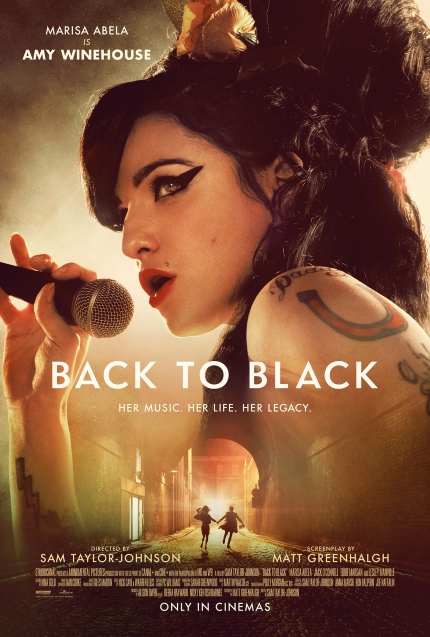BACK TO BLACK Review: Amy Winehouse Gets the Conventional Biopic Treatment
Marisa Abela stars in the music-themed drama, directed by Sam Taylor-Johnson.

When Kurt Cobain, the lead singer and lyricist for Nirvana, died in 1994, the result of a self-inflicted gunshot wound, his mother was quoted as saying, “He had to go and join that [expletive] club.”
A membership fee or long-form application isn’t required for the club in question, but dying at 27, inadvertently or intentionally, is a prerequisite. Cobain joined other musically talented artists, e.g., Jimi Hendrix, Jim Morrison, and Janis Joplin (among others), in dying prematurely, in turn guaranteeing a form of immortality.
Like far too many of her predecessors, Amy Winehouse passed from this world to the next far too early, her musical gifts only barely explored over two sensational albums, Frank and Back to Black. The latter became a worldwide hit, spinning off multiple singles, including the title track, and winning five Grammy awards, all before Winehouse turned 25.
Three years later, Winehouse was gone, officially the result of alcohol poisoning, but unofficially (and less directly), the result of a short lifetime of alcohol and substance abuse, bulimia, and likely — likely because it went undiagnosed or properly treated — mental illness.
Given Winehouse’s tragic end, a biopic, justified or not, seemed inevitable. That biopic, Back to Black, directed by Sam Taylor-Johnson (A Million Little Pieces, Fifty Shades of Grey, Nowhere Boy) from Matt Greenhalgh’s (Nowhere Boy, Control) estate-approved script, offers precious few insights into Winehouse, either as an individual suffering from all-too-familiar substance abuse problems or as an undoubtedly talented musical artist, one of the best of her generation, as she alchemically transformed her personal experiences into transcendent, generational art.
Compressing months and years into seemingly days and weeks, Back to Black takes a key events/macro approach, faltering and occasionally failing at every step. The film roughly covers the last decade of Winehouse’s life, from 2002 when, at 18, she began writing and performing the songs that would coalesce into her first album, Frank, through the overwhelming success of Back to Black less than six years later, and briefly, through the end of her life in 2011.
In 2002, Winehouse (convincingly played by Marisa Abela), still lives at home with her (mostly offscreen) mother, and visits her extended family, including her father, Mitch (Eddie Marsan), and grandmother, Cynthia (Lesley Manville), for a brief glimpse into Winehouse’s Jewish background. Amy turns a traditional Jewish sing-a-long into a rousing duet of “Fly Me to the Moon” with her father. A frustrated performer, Mitch drives a cab by day or night while semi-officially serving as Amy’s confidante and business manager. (Mitch inherited Amy’s estate and authorized this biopic.)
The modest success of Amy’s first album leads to conflict with her record label, Island Records. The male-dominated powers-that-be want Amy to change up her onstage performing style, drop playing the guitar onstage, and otherwise let them mold her in their preferred image. Amy understandably balks, an act of rebellion that sends her into the most productive, meaningful period in her short life, developing the raw personal and musical materials for her next album (live first, record second), Back to Black.
Fortuitously at first (later the opposite), Amy meets Blake Fielder-Civil (Jack O’Connell), her future boyfriend, ex-boyfriend, husband, and ex-husband, at a local pub. Blake easily romances the vulnerable Amy, playing to her vanity by singing along to one of her songs and then introducing her to “Leader of the Pack” by the Shangri-Las. Blake’s involvement with another woman proves to be a negligible obstacle for Amy, one she easily overcomes through a combination of fame, money (he’s broke), and a free place to stay (he’s virtually homeless).
Despite its earnestness and O’Connell delivering next-level charm as Blake, the scene feels overly contrived, a failed attempt to make the highly problematic Blake a sympathetic figure. Given what follows — years of mutually destructive behavior, alcohol, and substance abuse (Blake introduces cocaine and heroin into Amy’s life) — the scene, like most of the scenes where drinking and drug use occurs offscreen, is less an attempt to sidestep accusations of exploitation than to avoid a potential lawsuit from the real-life Blake.
After an emotionally devastating break-up with Blake, Amy channels her inner torment into producing Back to Black. Latter scenes allow Abela to duplicate Amy’s voice, inflections, and mannerisms, all of which she does more than ably.
There’s little context for them, however, a deliberate absence of effort by Taylor-Johnson or Greenhalgh to examine, even superficially, the years-long creative process that led to the creation of individual songs. Notably, Mark Ronson, one of Amy’s chief collaborators and a co-producer on Back to Black, gets a single namecheck and is never mentioned again.
While Blake sidesteps almost all responsibility for contributing to Amy’s substance abuse problems, Mitch’s portrayal makes him, if not exactly a blameless, saintly figure, then a slightly distracted, well-meaning one, singularly dedicated to his daughter’s well-being and success, but emotionally and intellectually unequipped to do anything substantive about helping his daughter.
At one point in the film, Mitch shrugs his shoulders and utters “she’s fine,” when the subject of rehab comes up. Asif Kapadia’s Oscar-winning documentary, Amy, paints a less generous, far more troubling, picture of Mitch and his relationship with his daughter.
Back in Black opens today, only in theaters, via Focus Features. Visit the official site for showtimes and locations.
Back to Black
Director(s)
- Sam Taylor-Johnson
Writer(s)
- Matt Greenhalgh
Cast
- Marisa Abela
- Eddie Marsan
- Jack O'Connell







